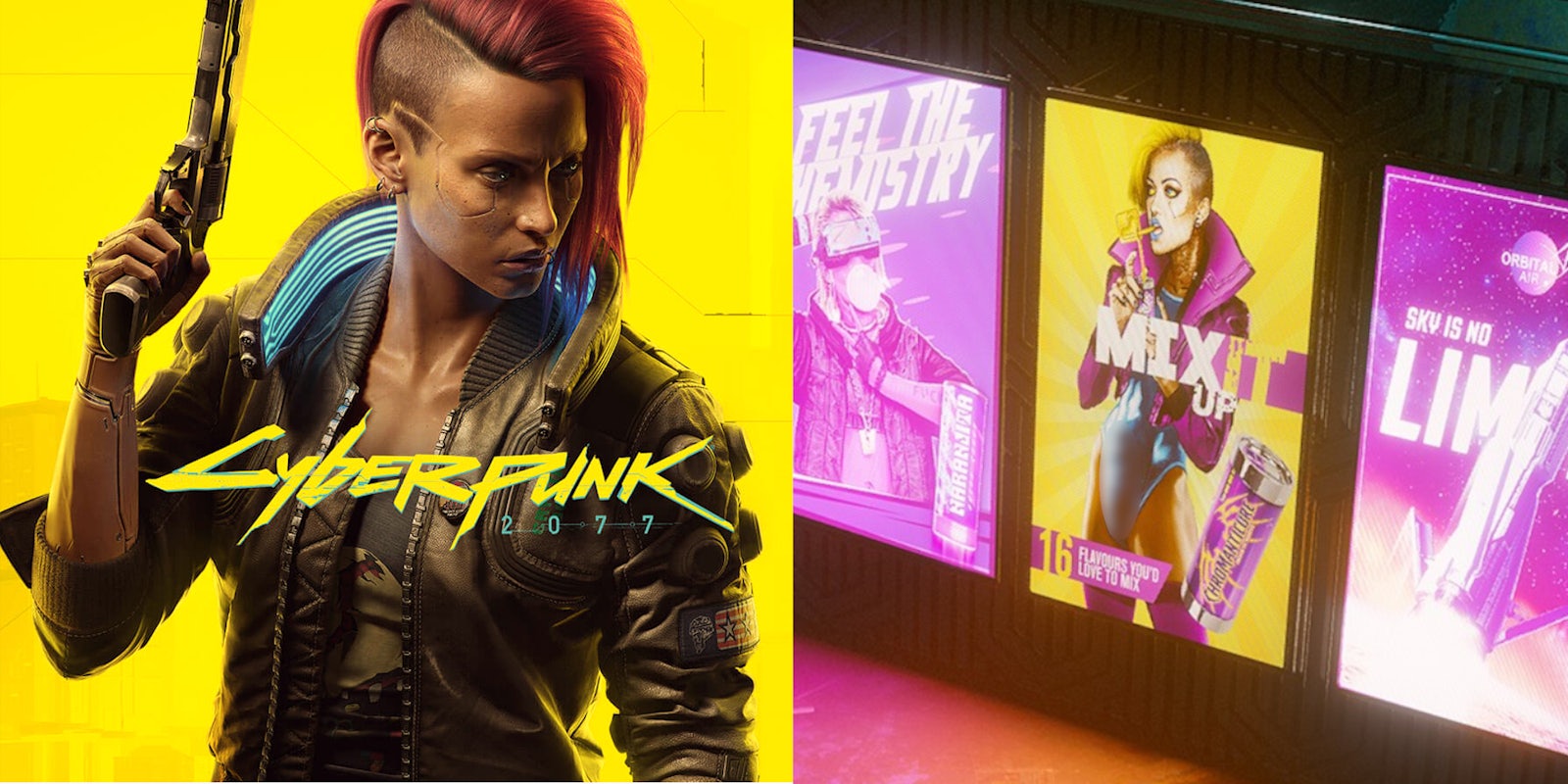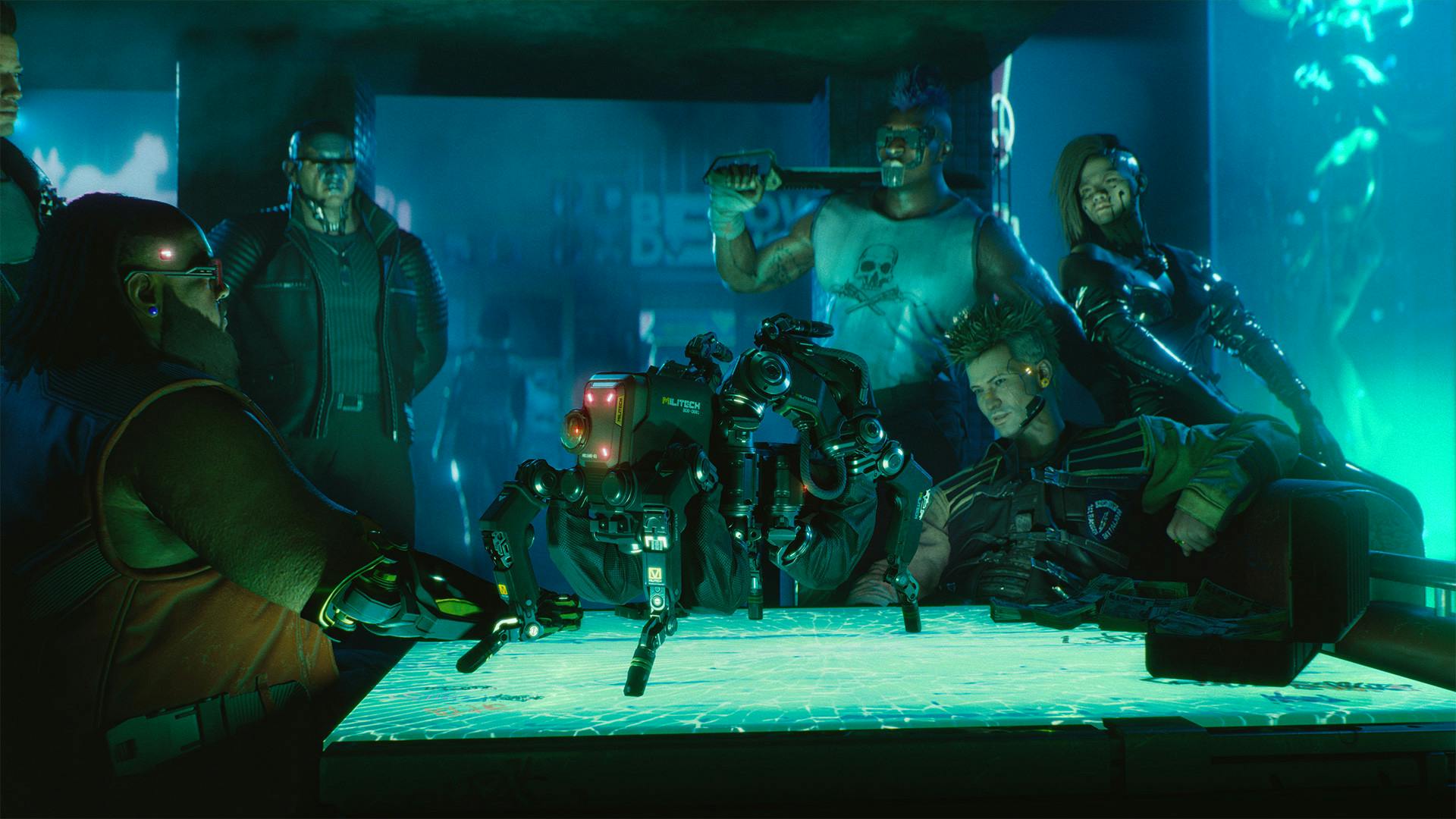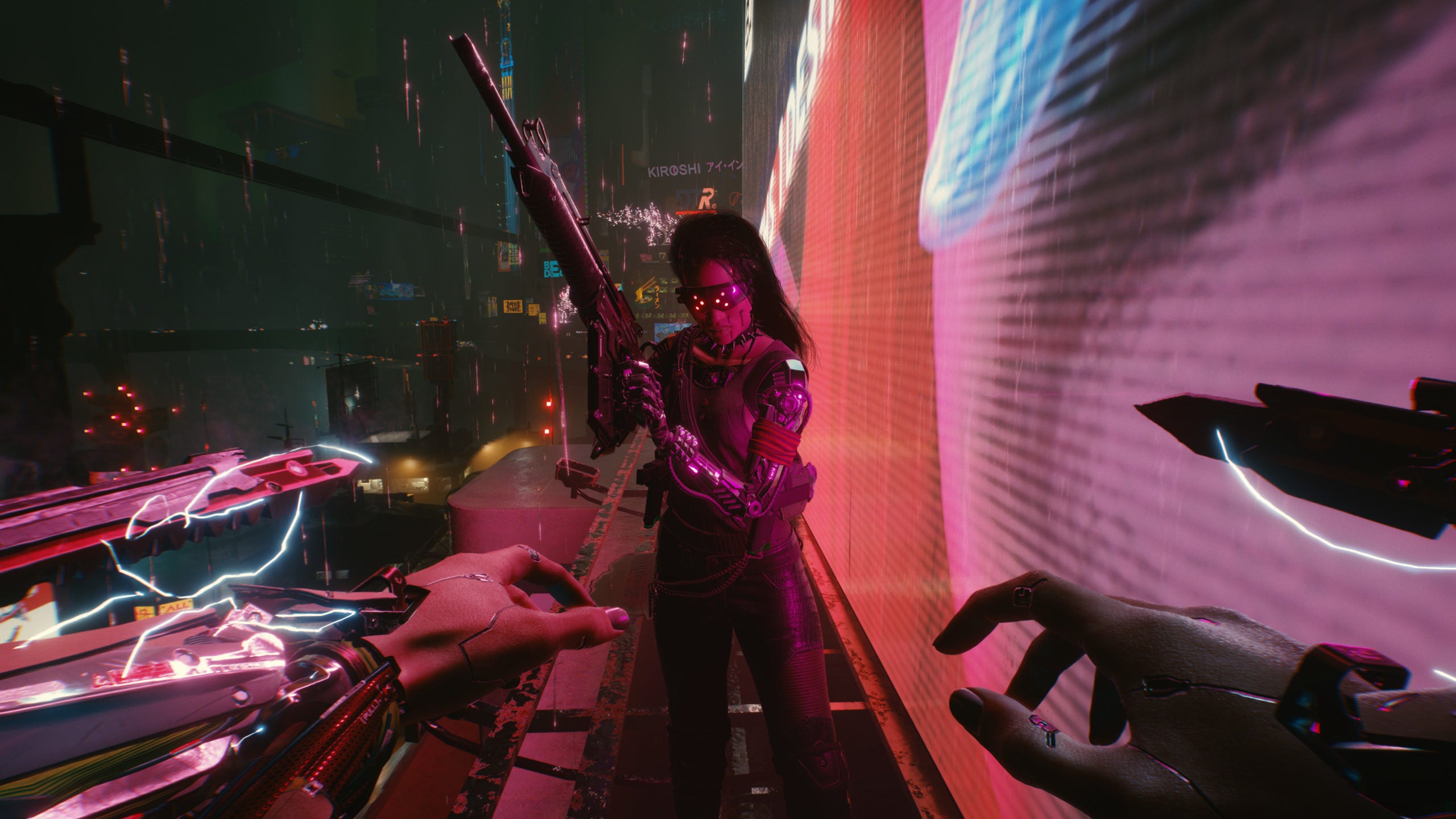Analysis
CD Projekt Red’s massive, open-world cyberpunk shooter Cyberpunk 2077 comes out this week. Over the past two years, I’ve reported extensively on Cyberpunk’s troubled relationship with trans people. And I am very tired.
First, there was the “Chromanticore” ad, showing a trans feminine character with a bulging erection. At best, this was a heavy-handed commentary on trans feminine objectification. At worst, the ad is a joke: Do you expect to see a woman with a rock-hard cock selling soft drinks? Probably not.
Then, there was the game’s lopsided revision of its character creator. While players can customize their genitals independently of their gender, Cyberpunk 2077 ties players’ pronouns to their voices, and there’s no nonbinary pronoun option. This is cisnormative in design, reinforces the gender binary, and equates gender identity with one’s voice and speech. Women sound like cis women, men sound like cis men. Go figure.
In between these controversies, the Cyberpunk 2077 social team has been less than inclusive toward trans people, and CD Projekt’s GOG crew has had its fair share of blunders, too. Then there’s the game’s anxiety with cybernetic augmentations and its obsession with the unmodified body. Because characters augment their bodies, the body is “no longer sacrum [sacred]; it’s profanum [profane],” and thus the game’s characters “are losing their connection to the body, to the meat” as Cyberpunk game director Adam Badowski told Polygon in 2018.
In other words, to augment one’s body is to lose one’s humanity. That’s a conservative notion—one commonly espoused by transphobes and whorephobes—that misses transhumanism’s liberating aspects for trans people, gender-nonconforming people, and marginalized groups who do not fit into the traditional (cishet, white, and able-bodied) mold.
Now, we’re finally seeing what these politics mean for players purchasing the game on Dec. 10, its final release date. An initial preview from Riley MacLeod at Kotaku shows a diverse game world, and yet “race, queerness, or transness don’t feel like topics the developers are interested in specifically addressing or exploring,” he writes. Trans characters are generally rare, and the few times trans characters do appear, they’re usually subject to microaggressions about their transness, such as on objectified billboards in the game’s world.
This, as Polygon’s Carolyn Petit notes, leaves little room for affirming interactions that contrast with these hypersexualized depictions of trans bodies. Meanwhile, players “constantly meet, interact with, and form relationships with cis characters who have far more dimension than the surface of any sexualized image on a billboard,” Petit writes.
It would be easy to say that I hate Cyberpunk 2077 for this problem, that I want nothing to do with this game, and that every trans person feels the same way.
But as MacLeod and Petit’s writing shows, that’s just not true. No two trans people agree about this game; instead, we each have our own unique take on its problems, as I previously wrote about. That includes me. As a well-known trans critic in games and as a trans woman who just likes video games, Cyberpunk 2077 has left me with a complicated cocktail of feelings from anger to excitement to fear. How the hell do I navigate this game as a trans woman? Sadly, there is no correct script.
Somewhat expectedly, Cyberpunk 2077’s launch week has already been a nightmare.
First, there’s the review embargo. Early review scores were generally leaning toward perfect scores, but not universally: PC Gamer gave Cyberpunk a 78 and GameSpot bestowed the game 7. As mentioned above, outlets like Polygon and Kotaku revealed a game with lofty aspirations but narrative flaws. For many gamers, this valid criticism was way too much to handle. Or as one viral tweet from YouTuber and Twitch streamer Parris puts it: “I’ve said for weeks this game will not be perfect and judge it on your own merits.”
Then there’s Cyberpunk 2077’s epilepsy-triggering moments. Game Informer’s Liana Rupert, who experiences epileptic episodes herself, wrote a guide to the game examining where key gameplay moments may induce seizures. In response, fans harassed her with “hundreds of videos disguised as support” that deliberately “induce photosensitive triggers,” she wrote on Twitter. It is baffling that this is where the games community is six years after Gamergate, still dealing with the same harassment campaigns, still filled with gamers who do not feel an ounce of empathy toward people who have it just a little bit harder than them.
This is the culture games critics find themselves in. It is fundamentally hostile, harassing, and unconcerned about the writer on the other side of the screen, let alone one trying to help at-risk people navigate a game. It fosters harassment campaigns and can lead to serious harm for the targets, whether it’s emotional or physical.
I think about this culture a lot because I try to be a force for change in the games community. I feel grateful I have a platform, and I try to pay it forward. I try to write stories that insist there are new ways to think about playing video games and that there are more steps we can take to support queer, adult game developers. But for a trans critic like myself, Cyberpunk 2077 puts me in an awkward position. Do I owe it to my fellow trans readers to write extensively about Cyberpunk 2077? Should I painstakingly play through the game, uncover its every nook and cranny, and try to unpack its politics as thoroughly as possible? Or could this backfire, and do more harm than good?
When I was a newer games journalist, I probably would’ve answered, “Yes, let’s show the world a trans woman can break stories too!” Now, I’m not so fast. Games reviews are laborious, underpaid work even in the best of circumstances; for a game like Cyberpunk, I run the risk of burning myself out by constantly obsessing over bigoted subtext and overtones that we know are already there. And even if I were to take up such a tall task, what would be the end result? Probably yet another harassment campaign. The thought of that looming over my head would be debilitating, in part because I’ve dealt with a number of them this year alone. A platform does not give you superpowers, just a louder voice.
Underlying that need to speak, to report, and to criticize is a lot of resentment and anger toward the games community, including my fellow games journalists. While games media has covered Cyberpunk 2077’s handle on trans bodies pretty extensively, it’s done so with the understanding that Cyberpunk coverage is inevitable. Every major gaming website has covered Cyberpunk 2077 news extensively, and guides to Cyberpunk’s various gameplay mechanics and missions are inevitable. Cyberpunk 2077 is too big to avoid.
No amount of criticism will stop the coverage or lead people to seriously consider pulling their money from a pre-order. And it feels increasingly like an uphill battle to get cis games journalists to take trans critics seriously. I fear even the best allies in the games media world are nervously waiting to ask the question, behind closed doors, when trans people aren’t in the room: “OK, but are you going to play Cyberpunk though?” No matter how loudly trans people warn cis people about the game’s problems, no matter how much coverage we write about its objectifying themes, trans peoples’ concerns never outweigh cis pleasures. It’s just a game you have to play.
There lies the irony of the situation. Underneath all that noble indignation, and underneath all that anger, and as much as I’ve complained about Cyberpunk 2077 (and I’ve done it extensively on Twitter), I still want to play it. I love cyberpunk, and I’ve written about cyberpunk adult titles a lot over the past few years. Ghost in the Shell remains one of my favorite films, as does Blade Runner. Even one of my favorite albums, Kiss Land by The Weeknd, is extensively inspired by the genre. It would be easy for me to avoid, say, The Witcher 4. I don’t care for fantasy titles. It’s harder to ignore Cyberpunk when so much of the media I adore is inspired by cyberpunk if not outright part of the genre.
Still, in good faith, I cannot buy Cyberpunk 2077. But if I were to somehow come across a copy in the wild, delivered to me by some manner or shape that did not involve directly giving CD Projekt Red 60 bucks, I’d still want to try it. Even a vocal critic isn’t immune to the dazzle, the lure, the fear of missing out.
Does this make me a hypocrite? Maybe. I’m only human, and I’m not immune to inconsistencies. But I think placing that burden on my shoulders is missing the point. I did not create Cyberpunk 2077, nor would I create something like it, complete with its heavy-handed and tone-deaf grasp on trans issues. Rather, these complicated and contrasting feelings reflect what it’s like to be a marginalized person in games. They reflect the masochistic pain to enjoy games that delight us, that fill us with imaginative wonder, and yet disappoint us because one (or more) aspects of our identity are not invited. We are allowed to slink in Cyberpunk’s code, but it is never for us, merely about us.
These problems can’t be fixed by simply voting with your dollar. The hostility and antagonism shown toward Cyberpunk 2077 critics suggest a far larger cultural problem with games, and, by extension, the overarching sociocultural oppression that exists against marginalized communities in the West. Whatever is going on within CD Projekt Red that led to Cyberpunk 2077’s problems requires cultural change on a far larger scale—both within the games community and outside of it.
Until then, those of us who find ourselves rendered both hypervisible and utterly invisible within Cyberpunk 2077’s world are placed on a narrow, impossible tightrope. To buy or not to buy? To play or not to play? There is no correct answer. Trans people are forced into a game they cannot win. Go easy on us. It is an unenviable position.
Today’s top stories
| ‘Fill her up’: Bartender gives woman a glass of water when the man she’s with orders tequila shot |
| ‘I don’t think my store has even sold one’: Whataburger employees take picture with first customer who bought a burger box |
| ‘It was a template used by anyone in the company’: Travel agent’s ‘condescending’ out-of-office email reply sparks debate |
| Sign up to receive the Daily Dot’s Internet Insider newsletter for urgent news from the frontline of online. |




